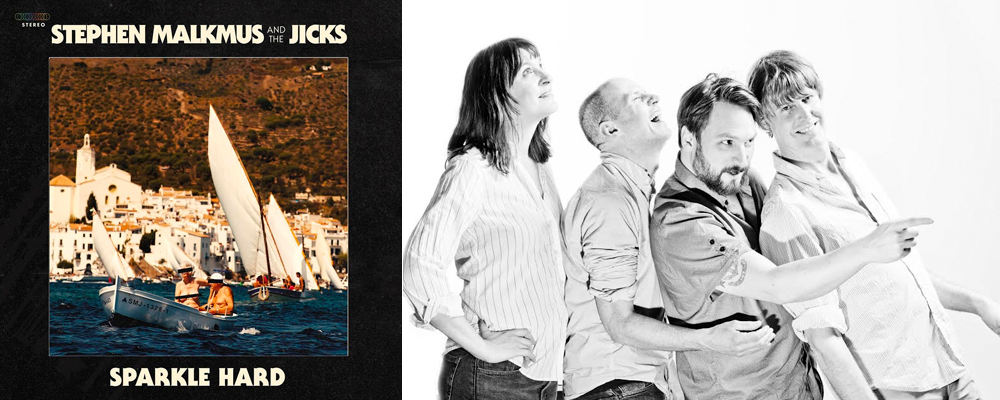Stephen Malkmus and the Jicks’ ‘Sparkle Hard’ Is Sprawling and Sensational
Adi Mehta
Stephen Malkmus is often credited for spearheading the indie rock movement of the ‘90s with his original band Pavement. He seems the very embodiment of the ambiguously defined “indie” aesthetic, exemplifying all its key characteristics: an embrace of amateurism, with imperfections worn as a badge, a stance more maturely accepting of convention than punk’s disavowal, yet betraying an implicit disdain for lackluster pop fare. Creativity and DIY authenticity are prized above all other attributes. Malkmus has turned out music of this strain for a quarter century, winning a cult following. His current band, The Jicks, having released music since 2001, have delivered a new record, “Sparkle Hard,” that showcases the band doing what they’ve always done: channeling the aforementioned indie aesthetic into bigger, bolder musical avenues.
The record is full of sprawling rock, interesting chord progressions, and intricate, whimsical guitar work, beginning with “Cast Off,“ a reflective piano-led piece that erupts into grand blaring guitar rhapsody. “Future Suite” is simultaneously jaunty and oblique in the way that Malkmus and crew always seem to pull off so well. “Solid Silk” mixes cheery, twangy, southern rock stylings with lush string arrangements that are a bit Seargent Peppers in their silly excesses. Malkmus’ laid back vocals, as always, imbue the music with a certain cool quaintness. There is some quirky, vivid imagery in phrases such as, “Rubber bullets for the clown” and “Plastered as a wedding cake that light makes right.” Next, “Bike Lane” begins with a distorted bass stomp, over which Malkmus sings, “Another beautiful bike lane.” As the song fleshes out into a swingin’ good-time rock ‘n’ roll number, the effervescently voiced lyrics that enter the mix are, “The cops, the cops will kill Freddie,” clearly a reference to the case of police-murdered Freddie Gray. What seemed like a happy hipster ode to bike lanes is suddenly a macabre meditation on inequality and questionable priorities. Malkmus goes on to rechannel the lingo of “Johnny B. Goode,” with the supremely sarcastic, “Go, Freddie Go.”
“Middle America,” one of the album’s most infectiously satisfying moments, is classic Malkmus, with a reflective mood created by guitars feeling out notes and sketching out figures in tandem with the singer’s musing utterances. The song seems to voice the sentiment that “It’s trying that counts,” but of course, Malkmus is above such platitudes, opting instead to say, “Blame stops until you do.” Such oddly worded expressions are interspersed with gems like, “You know you should be blushing / To a hue of Robitussin.” The next track, ”Rattler,” is pretty left-field, beginning with — gasp — Auto-tune, over an odd, repetitive stomp. Then, an eruption of drum fills prompts a rechanneling of bombastic, late sixties prog rock visions via the contemporary sound kit. Next, “Shiggy” achieves much of its magic by means of Malkmus’ playful, idiosyncratic vocal inflections. Consider how he says, “So damn tall,” all rubber, elastic, and honey, or the sporadic, reverberated interjections in which he yelps and curses. Such moments add so much character, and make all the differences.
“Kite” is a funky number, abounding with wah-wah pedal riffage. The way the guitars play modified versions of Malkmus’ vocal melodies add color, depth, and animation. Classic rock dueling guitars, prominent throughout the record, are indulged especially freely on this song. “Brethren” calls to attention another staple of Malkmus’ that makes his songwriting so charming. It’s the freely meandering singing to droll, capricious meters, in the tradition of such diverse, free spirits as Syd Barrett and The Pixies. “Refute” establishes a decidedly southern feel, with festive fiddling. Kim Gordon makes a guest appearance, serving as an ideal feminine counterpoint to Malkmus, with her similarly casual and quirky intonations. Her voice seems to have grown more husky over the years, and the mere sound of it in this musical setting is fresh and rather thrilling. Lyrically, the song seems to straddle the line between idealistic optimism and cynical reservation; Malkmus sings,“The world was telling him love is dead / But he’s turning that logic on its head,” but Gordon later warns, “Marry on now, children / But be aware, the world doesn’t want you anymore.”
Finally, “Difficulties / Let Them Eat Vowels” is two songs combined in one track. The cryptic lyrics make the reason for this a mystery, but it’s, at any rate, an interesting listen. At times, one can’t help but wonder whether Malkmus even knows exactly what he’s talking about, a possibility perhaps alluded to in the title, “Let Them Eat Vowels.” The first component is a spacious, spread-out, sentimental waltz with soaring vocals, fading into silence briefly before the second part brings back the funk aesthetic heard earlier of “Kite.” There’s a vocal moment reminiscent of “Sonic Youth’s “Winner’s Blues. Malkmus sings along with a pitched-down version of himself, and the treated, combined vocals morph and bend his sounds, justifying the song’s title, as it literally sounds like he’s eating his vowels.
The best indie rock utilizes enough pop signifiers to make infectious tunes, but renders them with enough originality and off-kilter crafting to make them consistently novel and exciting. On “Sparkle Hard,” Stephen Malkmus & the Jicks do exactly this. The songs abound with restless musical creativity, as well as clever, abstruse lyricism. It’s the work of seasoned songwriters in top form.
“Sparkle Hard” is available May 18 on Apple Music.

